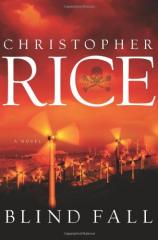Blind Fall
Review
Blind Fall
BLIND FALL by Christopher Rice begins with a flashback to the
battlefields of Iraq. On the ground John Houck makes a mistake. He
wasn’t paying attention when he approached a boy, a dog and
the wreck of a car that was really a bomb that exploded into a
fiery “jagged white flame. John ate dust and felt the weight
of Mike Bowers come down on him… [even after] Bowers was
pulled off him, John still found himself unable to move… the
explosion shut out sound and thick black smoke blinded
him.”
Despite his inability to think clearly, somewhere in his failing
consciousness, John knew that something terrible had happened to
Captain Mike Bowers, the man who took the hit for him. John’s
wounds were not life threatening nor were they difficult to treat.
Mike, on the other hand, was badly hurt: he lost an eye and had two
broken legs and other injuries. They were both flown out of the
desert, and that was the last time the two saw each other for
years.
John was riddled with guilt for not having an opportunity to thank
Mike for saving his life. He had written to him, called him and
finally found the courage to visit him. This journey is the second
pivotal event that changes the timbre of the book. He makes the
trip only to find Mike dead in his bed. Stunned, he soon realizes
that he hears someone sneaking through the house. After a chase
through the neighboring woods, John catches the
“intruder.” The fellow is terrified and keeps crying
out asking where Mike is. In his rage and automatic snap into his
special Marine training, John doesn’t listen to the
man’s pleas. He drags his “prisoner” out of the
trees to re-enter the house.
Still not really paying attention to the guy, John becomes
transfixed when he sees the wall of pictures. The second photo that
catches his attention shows “Mike [sitting] on a bar stool,
beaming, as he received a big wet one on the cheek from the guy
[John] had almost killed. As he gazed at the “moment caught
in time” he is able to see the shirt the bartender was
wearing: “[It] said The Catch Trap, a gay bar in San Diego
that was the punch line to some of the fag jokes John heard while
he was stationed at Camp Pendleton.”
Alex Martin is the man who shouts that he lives in the house with
Mike. The sheriff is summoned; Alex tells him and John that someone
came into the house and that he was frightened and hid in the
woods. That’s where John accosted him with snarling, palpable
rage and almost killed him. They all trudge upstairs to the bedroom
and find nothing --- Mike is nowhere to be found! “Whoever
committed the murder moved the body.” In a sort of
interrogation Sheriff Duncan explains to John that he is free to go
because the official story is: “…you came up here with
the best of intentions, and you walked into…some kind of sex
game. Let’s just say you misread the scene, which is
understandable. But it’s not murder…” He
insinuates that John “saw something that wasn’t
there” because, like so many battle-weary vets, John is
probably suffering from PTSD.
Mike had a secret life he felt he couldn’t tell John about,
and at that moment John starts to understand that things he took
for granted in their friendship were not as concrete as he thought.
This is when John embarks on a crusade to find out what happened to
his buddy; John feels he owes him at least that much. John and Alex
become a team, and as they proceed, John encounters more emotional
pain and becomes aware that Alex was the real target.
John decides that he is going to protect Alex from the demons that
are hounding him, and this decision precipitates a rapprochement
with his estranged sister. As John meets people from his past as
well as the present, he is amazed that they know so much about him
and his life. It’s almost as though a dark shadow stalked him
for years, accumulating information for some kind of surreal file.
As he slowly starts to allow himself to “hear” what is
said to him, he begins to take stock of himself and his
self-image.
The main plot is straightforward and chilling, but Christopher Rice
has that special talent shared among extraordinary writers that
allows them to string several sub-plots together throughout the
narrative, which, at the end, emerge in a cogent whole. This deftly
written story races from event to event and seduces the reader into
following the clues as if they were breadcrumbs.
As the narrative is propelled by sharp prose, the characters emerge
fully limned. And in his wisdom Rice has changed the way he
presented homoeroticism in his earlier novels. Here he chooses to
tell his tale from the characters’ points of view and how
each event impacts their lives. This device saves BLIND FALL from
being a military-straight-gay-macho treatise. He said in an
interview: “I like to joke that John is my first truly
straight character.” And the story is told mainly from
John’s point of view, which brings readers into his
thoughts.
Christopher Rice, the son of Anne Rice, grew up in New Orleans, and
he does bring a sense of the surreal that has always been
associated with that city. His previous titles, A DESTINY OF SOULS
(2000) and THE SNOW GARDEN (2001), gave readers a glimpse of the
depth of his talent. BLIND FALL shows how each book reflects his
maturity as a writer and the way he keeps a steady equilibrium
among the many twists this novel takes.
Reviewed by Barbara Lipkien Gershenbaum on December 22, 2010





